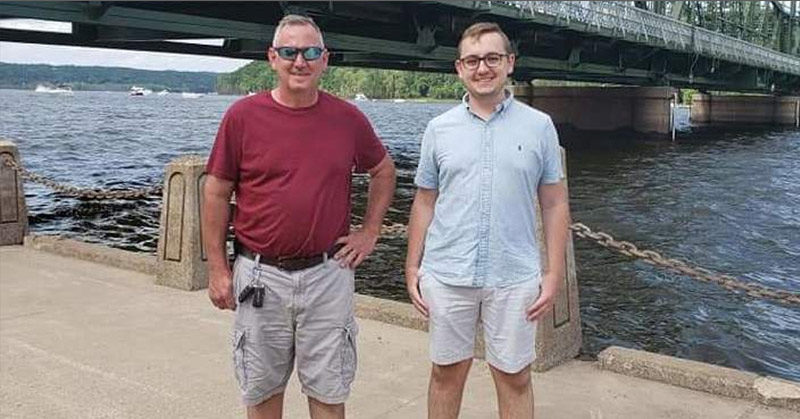Studies have shown that more than half of combat veterans with PTSD had nightmares fairly often [1]. These nightmares make it nearly impossible to fall asleep and can disrupt your life in a major way. In many cases, they can cause the degradation of relationships, job loss, and addictions. One son saw his own father heading down that path and developed a smartwatch app to save him.
Patrick and Tyler Skluzacek’s Story
Tyler Skluzacek’s father, Patrick, is a US army veteran who served in Iraq. Before leaving home, Tyler says his dad was a fun and outgoing man. Upon his return in 2007, however, he was different.
Patrick was experiencing PTSD as a result of the time he spent in combat. Almost every night, Patrick was having terrible nightmares that caused him to sweat profusely and thrash around violently in his sleep. The dreams were so powerful that Patrick became afraid to close his eyes at night.
He began depending on either vodka or medication in order to get any sleep at night. Patrick’s trauma began taking over his life. Pretty soon his marriage fell apart, and then he lost his job and his house.
“[I] pretty much lost everything,” he said [2].
Like any good son, Tyler wanted to help his dad. This is when he decided to develop a smartwatch app.
A Hackathon and a Smartwatch App
In 2015, Tyler heard about a computer hackathon that was happening in Washington, DC. A Hackathon is a very intense few days when developers collaborate to solve problems, usually by designing app prototypes [2,3].
This particular event grabbed Tyler’s attention because focus was on developing apps to help people suffering with PTSD.
Despite being a student with few financial resources at his disposal, Tyler managed to get enough money to buy a plane ticket to Washington. Once he was at the event, he put together a team of developers to help him “teach” a smartwatch to detect when the wearer was starting to have a nightmare. To do this, they used physical queues like heart rate and movement.
Service dogs already do this and will nudge or lick the person until they wake up. Tyler thought that a smartwatch app could achieve the same thing with a gentle vibration. The goal was to provide just enough stimulus to pull the wearer out of deep REM sleep to stop the nightmare, but not to actually wake them up.
Developing the Smartwatch App
Of course, Tyler used his own father as the test subject for the smartwatch app. Not surprisingly, it took some trial and error before they got the app to successfully detect a nightmare and respond with the correct amount of stimulus.
Patrick wore the watch 24/7. In the beginning, it would vibrate too hard and jolt him awake.
“He had to endure a lot of bad versions of the application, as you can imagine, right? No application is perfect on the first try. It was iteration, iteration, iteration,” Tyler explained [4].
Watching his dad’s readings all the time was also a very interesting experience for Tyler.
“Watching someone’s data 24/7, I feel like is a lot like having a baby,” he said. “I don’t have a baby. But you’re suddenly very concerned at all hours.” [2]
He added that having someone that close to you and knowing exactly when the nightmares were happening was very important to train the app. Tyler continued to fine-tune the smartwatch app until he finally perfected the algorithm.
A Changed Life
Tyler’s smartwatch app effectively turned his father’s life around. Patrick calls the watch’s vibrations “little miracles”. He says that the difference the watch has made for him is like “night and day”.
Wearing the watch and ending his night terrors allowed Patrick to find normalcy in his life again. He is back to working as a mechanic and has even remarried. He does still have nightmares occasionally, but they no longer take over his life the way they used to.
The FDA has recently approved the app as a treatment for PTSD-related nightmare disorders. An investor has now purchased the rights to the app and has started a company called NightWare. Soon, more trauma sufferers will be able to use Tyler’s app, and hopefully get their lives back the way Patrick did.
“It was honestly pretty incredible to have done something for my dad that, you know, positively influenced his life and using technology,” said Tyler. “So I’m a big tech guy. And being able to make someone’s life better and use technology was just a win-win.” [4]
Keep Reading: California Couple ‘Adopts’ 93-Year-Old Veteran After His Town Burned to the Ground
- https://www.ptsd.va.gov/understand/related/nightmares.asp#:~:text=Of%20those%20with%20PTSD%2C%2071,may%20have%20them%20quite%20often
- https://www.npr.org/2020/12/06/943647610/he-designed-a-smartwatch-app-to-help-stop-his-dads-nightmares
- https://www.apa.org/science/about/psa/2020/03/hackathon
- https://www.npr.org/2020/12/06/943604709/fda-approves-smart-watch-application-to-help-those-with-ptsd#:~:text=FDA%20Approves%20Smart%20Watch%20Application%20To%20Help%20Those%20With%20PTSD%20%3A%20NPR&text=Live%20Sessions-,FDA%20Approves%20Smart%20Watch%20Application%20To%20Help%20Those%20With%20PTSD,story%20with%20NPR’s%20Debbie%20Elliott.

